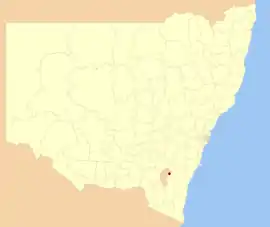City of Queanbeyan
Queanbeyan City was a local government area located in south eastern New South Wales, Australia. The former area is located adjacent to Canberra and the Australian Capital Territory, the Queanbeyan River, the Molonglo River, the Kings Highway and the Sydney-Canberra railway.
| City of Queanbeyan New South Wales | |||||||||||||||
|---|---|---|---|---|---|---|---|---|---|---|---|---|---|---|---|
 Location in New South Wales | |||||||||||||||
| Coordinates | 35°21′S 149°13′E | ||||||||||||||
| Population | 40,568 (2013 est)[1] | ||||||||||||||
| • Density | 235.9/km2 (610.9/sq mi) | ||||||||||||||
| Abolished | 12 May 2016 | ||||||||||||||
| Area | 172 km2 (66.4 sq mi) | ||||||||||||||
| Last Mayor | Tim Overall | ||||||||||||||
| Council seat | Queanbeyan[2] | ||||||||||||||
| Region | Southern Tablelands | ||||||||||||||
| State electorate(s) | Monaro | ||||||||||||||
| Federal Division(s) | Eden-Monaro | ||||||||||||||
| Website | City of Queanbeyan | ||||||||||||||
| |||||||||||||||
On 12 May 2016 the Minister for Local Government announced dissolution of Queanbeyan City with immediate effect. Together with the Palerang Council the combined council areas were merged to establish the Queanbeyan-Palerang Regional Council.
The last Mayor of the Queanbeyan City Council was Tim Overall, an independent politician.
Cities, towns and localities
The Queanbeyan City Council area included the suburbs and villages of:
In 1998 Queanbeyan Council applied to have the localities of Letchworth, Larmer, Dodsworth and De Salis recognised as suburbs and these names were assigned by the Geographical Names Board of New South Wales. A more recent Council has had these names withdrawn.
Council
.jpg.webp)
Composition and election method
Until its dissolution, the Queanbeyan City Council was composed of ten Councillors, including the Mayor, for a fixed four-year term of office. The Mayor was directly elected while the nine other Councillors were elected proportionally as one entire ward. As of the election held on 8 September 2012, the makeup of the last Council, including the Mayor, was as follows:[3][4][5]
| Party | Councillors | |
|---|---|---|
| Independents and Unaligned | 7 | |
| Labor Party | 2 | |
| Australian Democrats | 1 | |
| Total | 10 | |
The last Council, elected in 2012 and dissolved in 2016, in order of election, was:[4]
| Councillor | Party | Notes | |
|---|---|---|---|
| Tim Overall | Independent | Mayor[3] | |
| Trudy Taylor | Independent | Elected on Tim Overall's ticket | |
| Brian Brown | Labor | ||
| Jamie Cregan | Independent | ||
| Sue Whelan | Independent | ||
| Velice Trajanoski | Independent | Elected on Tim Overall's ticket | |
| Peter Bray | Independent | Elected on Tim Overall's ticket | |
| Toni McLennan | Australian Democrats | Elected on Tim Overall's ticket | |
| Judith Burfoot | Labor | Elected on Brian Brown's ticket | |
| Kenrick Winchester | Independent | ||
Past Mayors of Queanbeyan
| Councillor | Term of office |
|---|---|
| J. J. Wright | 1885-1888 |
| John Bull | 1888-1889 |
| George Tompsitt | 1889-1890 |
| Edwin Henry Land | 1890-1891 |
| Nathan Moses Lazarus | 1891-1892 |
| Edwin Henry Land | 1892-1897 |
| William Pike | 1897-1899 |
| Patrick Blackall | 1900-1903 |
| James Pike | 1900 |
| Henry Hungerford | 1904-1905 |
| Edwin Atkinson | 1906-1907 |
| Ernest Hincksman | 1907-1909 |
| Richard Moore | 1909-1910 |
| Arthur Collett | 1910-1912 |
| Fredrick Woodward | 1913 |
| Richard Moore | 1913-1914 |
| Frederick Woodward | 1915-1917 |
| Arthur Collett | 1917-1920 |
| Frederick Woodward | 1920-1921 |
| James Harris | 1922-1924 |
| William Freebody | 1925-1927 |
| Henry Land | 1927-1929 |
| William Freebody | 1929-1932 |
| Henry Taylor | 1932-1935 |
| John Esmond | 1935-1939 |
| Henry Taylor | 1939-1951 |
| Ralph Spendelove | 1951-1954 |
| Arthur Lambert | 1954-1963 |
| Frederick Land | 1963-1980 |
| David Madew | 1980-1991 |
| Frank Pangallo | 1991-2008 |
| Tim Overall | 2008–present |
Amalgamation
A 2015 review of local government boundaries recommended that the Queanbeyan City Council merge with adjoining councils. The NSW Government considered two options. The first option was to merge Queanbeyan Council with parts of the Palerang Council to form a new council with an area of 3,791 square kilometres (1,464 sq mi) and support a population of approximately 55,000.[6] The alternative, proposed by Palerang Council on 29 January 2016, was for an amalgamation of the whole of Palerang with Queanbeyan Council.[7] On 12 May 2016 the Minister for Local Government announced dissolution of Queanbeyan City with immediate effect. Together with the Palerang Council the combined council areas were merged to establish the Queanbeyan-Palerang Regional Council.[8]
References
- "3218.0 Regional Population Growth, Australia. Table 1. Estimated Resident Population, Local Government Areas, New South Wales". 3 April 2014. Retrieved 11 September 2014.
- "Queanbeyan City Council". Department of Local Government. Archived from the original on 6 September 2006. Retrieved 25 November 2006.
- "Queanbeyan City Council - Mayoral Election". Local Government Election 2012. New South Wales Electoral Commission. 13 September 2012. Archived from the original on 22 March 2014. Retrieved 7 October 2012.
- "Queanbeyan City Council: Summary of First Preference and Group Votes for each Candidate". Local Government Election 2012. New South Wales Electoral Commission. 14 September 2012. Archived from the original on 22 March 2014. Retrieved 7 October 2012.
- "Democrats Welcome Local Councillor". Archived from the original on 26 January 2014. Retrieved 17 May 2013.
- "Merger proposal:Palerang Council (part), Queanbeyan City Council" (PDF). Government of New South Wales. January 2016. p. 7. Retrieved 10 March 2016.
- Palerang Council (29 January 2016). "Palerang and Queanbeyan City councils Proposal" (PDF). Government of New South Wales. Retrieved 10 March 2016.
- "Queanbeyan-Palerang Regional Council". Stronger Councils. Government of New South Wales. 12 May 2016. Retrieved 20 May 2016.